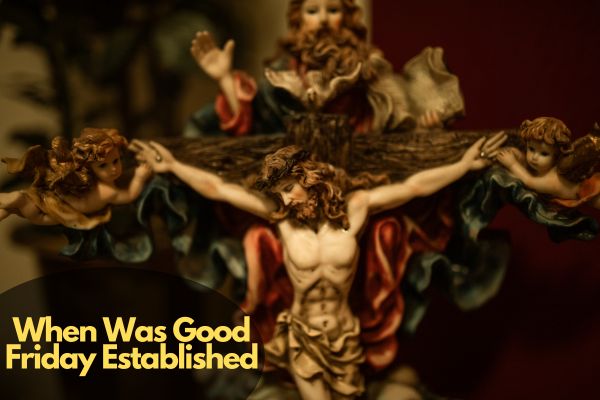Table of Contents Show
Good Friday originated as a religious observance in the early centuries of Christianity. Its precise origins, however, cannot be ascribed to a specific day or decree, but rather emerge from a combination of historical events, religious rituals, and theological thoughts.
The Crucifixion of Jesus Christ took place during the Passover holiday in Jerusalem, and it is a crucial event documented in the New Testament Gospels. Following Christ’s death and resurrection, early Christian communities began commemorating this event.
The early Christian church lacked standardized liturgical customs. However, as the faith expanded and communities increased, the need for organized worship and commemorations became apparent. The tradition of observing Good Friday most likely developed as part of this process, among other important Christian rituals.
Council and Synods:
Throughout Christianity’s early decades, several councils and synods met to resolve theological disagreements and establish doctrinal orthodoxy. While precise ordinances regarding Good Friday may not be written, these gatherings influenced Christian liturgical calendars and practices.
Influence of Cultural Traditions:
As Christianity extended across numerous regions, it came into contact with existing cultural and religious traditions. Elements of these many activities may have influenced the Good Friday commemoration, resulting in varying expressions and customs among Christian groups and countries.
Modern Observance of Good Friday:
Good Friday has long been a cornerstone of the Christian calendar, drawing believers around the world with its solemn observance of Jesus Christ’s crucifixion. This hallowed day, observed on the Friday preceding Easter Sunday, is significant in Christian communities and is characterized by a variety of rites, ceremonies, and acts of devotion. The many religious services held by churches around the world are fundamental to the Good Friday commemoration. These rituals, frequently marked by solemn tones and quiet atmospheres, serve as profound reminders of Jesus’ enormous sacrifice for the redemption of humanity. From traditional liturgies to contemporary worship events, Christians meet on this day to reflect on Christ’s passion and consider the profound theological implications of his crucifixion.
Prayer is central to the Good Friday commemoration, with believers engaging in genuine petition and intercession. It is a time for people to seek spiritual comfort, guidance, forgiveness, and regeneration in their relationships with God. Many churches host special prayer vigils or meditation sessions, allowing believers to connect with the divine in a deeply personal way.
Fasting is another typical Good Friday tradition. By refraining from food or certain indulgences, believers symbolically align themselves with Christ’s sufferings, indicating their dedication to spiritual discipline and self-denial. Fasting allows Christians to create a greater feeling of spiritual awareness and connection with those who face suffering and deprivation.
On Good Friday, communities often come together to help those in need and alleviate suffering in whatever way they can. People strive to emulate Jesus Christ’s attitude of selflessness and love through charity donations, volunteer labour, and acts of kindness to others.
In an increasingly secularized society, Good Friday remains relevant and significant, offering as a moving reminder of the continuing power of faith, sacrifice, and redemption. Across continents and cultures, Christians and non-believers acknowledge this solemn day, inspired by its everlasting message of hope and salvation.
Conclusion
The emergence of Good Friday as a crucial day in Christian history demonstrates the ongoing significance of Jesus Christ’s crucifixion. While the actual origins of its observance are obscured by history, its impact across nations and centuries is undeniable. Good Friday has been a cornerstone of the Christian calendar from its inception as a day of fasting and solemn thought, and it is still celebrated today with religious services and acts of charity.
As we mark this holy day, we are reminded of Jesus’ deep sacrifice and the timeless message of hope and redemption it represents. Regardless of one’s religious beliefs, Good Friday encourages everyone to pause, think, and embrace the universal values of love, forgiveness, and compassion. In doing so, we honour Christ’s sacrifice and renew our resolve to live lives of faith, empathy, and grace.








